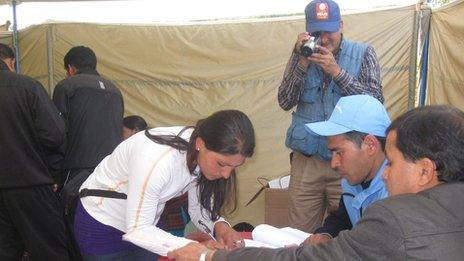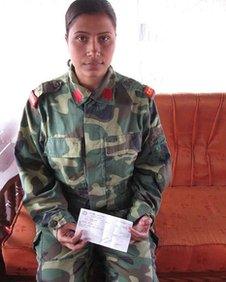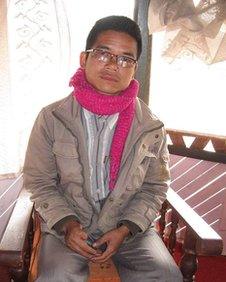Disillusioned former Maoist fighters of Nepal
- Published

For many former fighters the demobilisation process has been cumbersome and bureaucratic
More than 7,000 former Maoist fighters in Nepal, who have begun demobilising five years after they ended their armed revolt, have received money to help them return to civilian life. But as the BBC's Sanjaya Dhakal reports from Kathmandu, what was supposed to be a harmonious transition has ended up mired in rancour.
The mood among the seven camps of former Maoist fighters has in recent days been sombre and stressful.
Many of the former guerrillas who received cash under the voluntary retirement package are angry at the turn of events.
"They are handing out pittances as if they are trying to placate hungry tigers with promises of more to come," said Arjun Biswakarma, a platoon vice commander at the eastern Chulachuli camp.
Having served in the Maoist army for years, Biswakarma is now getting a retirement package of 500,000 rupees ($6,330/£4,030).
The government is providing cash cheques amounting to between 500,000 rupees to 800,000 rupees ($10,148/£6,440) - based on the seniority of former combatants - in two instalments.
The first instalment was recently distributed while the remaining half will be provided later this year.
There are also about 9,000 former fighters who chose to join the army instead of taking a pay-off and they are still waiting for integration to begin.
'Sacrifice' for peace

Former fighter Rohini Gautum still believes in her Maoist party leaders
Those receiving the payments however, feel neglected and left to negotiate the complex aftermath of life outside the camps with little support.
Shyam Bir Limbu was injured while fighting the army during Nepal's civil war. He will collect a cheque for 700,000 rupees ($8,878/£5,630).
He is suffering from the wounds inflicted by his erstwhile enemies and by what he calls the poor treatment he has been subjected to by the party and the state.
"We are totally dissatisfied. But we are keeping quiet because we think it was our sacrifice for the sake of peace and the constitution of Nepal," he told the BBC.
Another disabled combatant, Bhola Aryal, was even more bitter.
"Some of us need constant medical attention. They cannot move around without help. It is very sad that there is no-one to address our concerns," he said.
Some former fighters are however more hopeful. Rohini Gautam, a section commander, says she still believes in her Maoist party leaders - but even she has a complaint to make: "They should have given the full amount [of money] to us at once," she said.
Cheque seizures
There were also reports from fighters who said their cheques were being snatched by their commanders demanding a slice of money for the party.
A female fighter in Surkhet, western Nepal, went to the police demanding security after she was allegedly harassed by her commanders who wanted her to hand over a hefty portion of her package.

Shyam Bir Limbu was injured while fighting the state security forces
The Maoist leadership came up with an immediate rebuttal, describing such incidents as the results of localised disputes.
"There is no party policy to levy charges on retirement cheques," said Nanda Kishore Pun, chief of the Maoists' Peoples' Liberation Army.
However a commander from a camp in western Nepal told the BBC that the party was "looking at options" in terms of getting a slice of money from those combatants who spent most of their time away from the camps in the last five years.
"There were people who had gone away from the camps and even went to foreign lands for employment. They only appeared at the time of cash distribution," he said.
The issue has now been seized upon by opposition parties who have demanded a thorough investigation on accusations of cheque seizures.
More benefits needed
Ever since they were discharged by then United Nations Mission in Nepal (UNmin) two years ago, disqualified combatants have been piling pressure on the government and the Maoist party to get more benefits.
Even the party's fiercely-disciplined youth wing, the Young Communist League (YCL), showed their anger over being "short-changed".
In some areas of western Nepal, YCL members took to streets, locked up party offices, cut power lines to Maoist camps and even seized vehicles of party leaders.
When the Maoists launched their People's War in 1996, it attracted huge number of cadres with the promise of revolutionary change.
As they left their camps after 10 years of fighting and five years of living in camps, many fighters say that their dream of a "proletarian victory" was nothing but a pipedream.
"We are left clamouring even for basic benefits to injured comrades," Udaya Bahadur Chalaune, a vice commander of Shaktikhor camp, said.
- Published29 November 2011
- Published1 November 2011
- Published1 September 2011